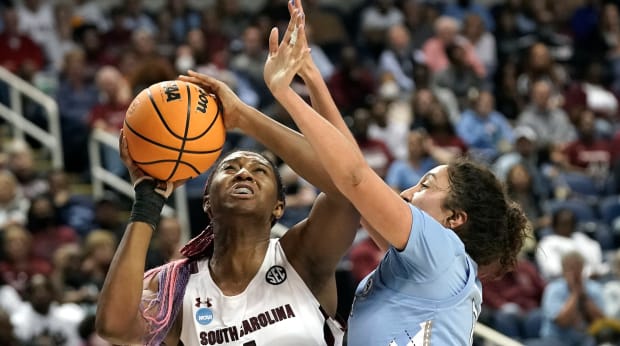GREENSBORO — Aliyah Boston needed only three seconds to score the first basket of the night—driving straight to the paint after the jump ball and sending it in for an easy layup.
It set the tone. In a fast-paced, aggressive contest, No. 1 South Carolina punched its ticket to the Elite Eight by outlasting No. 5 North Carolina, 69–61. And the difference-maker for the Gamecocks—as it has been so often this year—was Boston. She scored 28 points, one shy of her personal best, and finished with 22 rebounds. The night was a display of everything that has made her a leading candidate for national player of the year, and at the end, she took over entirely: All 13 of South Carolina’s fourth-quarter points came from her.
So: Was that what it looks like for Boston to take control, maybe to play a little mean, to consistently demand the ball?
“Not really,” laughed the junior forward. “I probably should have. I was just being patient."
Therein lay much of the distinction between this game and recent ones for South Carolina, most notably its second-round win over Miami, where the team had struggled offensively and seemed thrown by the pace of play. The mood was different against UNC. It was a tougher matchup, thanks in large part to a gutsy, driven effort from Tar Heels guard Deja Kelly. Yet the Gamecocks did a better job of staying in control throughout the night and playing to their strengths. And there is no strength like Boston.

AP Photo/Gerry Broome
“I thought she was just calm,” South Carolina coach Dawn Staley said of her star player. “Just trying to be patient out there, not to play as fast as she was playing in the Miami game … She did a good job of executing on game day.”
The Tar Heels pushed the Gamecocks close to the edge at points. They played fast, they were competitive on the boards and they came out shooting hot. (South Carolina’s lead was never greater than 11 and was as slim as four with just two minutes to go.) But UNC had Boston to contend with in the paint—and ultimately had no answer for her. She was the first player, man or woman, with at least 25 points and 20 rebounds to shoot 90% from the free-throw line in a tournament game since Bill Walton. Her size advantage was unavoidable; UNC had no one that could match her 6’5” presence. But her success was more than that—it was her vision, her demeanor and her ability to anticipate.
“[It was] us coming together and just telling her, ‘We need you to go in there and be dominant. When you get the ball, go score,’ said Gamecocks forward Victaria Saxon. “I really loved watching that, being a part of it, and just seeing her do what she do.”
Commanding as Boston was, of course, there was more to the win for South Carolina. The Gamecocks had made just four three-pointers against Miami. They had six in the first half alone versus UNC, led by guards Zia Cooke and Destanni Henderson, which noticeably disrupted the defensive plan for the Tar Heels.
“Our initial game plan in the beginning was really crowd the paint, really limit the bigs' touches,” Kelly said. “And then the guards kind of started going on their own little run. They were hitting outside shots, jumpers, which is something we were going to make them do, and they did.”
Still, this offense was not clicking as much as it would surely like to be at this time of year. The Gamecocks had eight assists to 14 turnovers and ultimately shot just 34% from the field. (The team has not shot above 36% in its last four games now.) In a sense, that’s a statement of just how incredibly strong the team is defensively: There aren’t many programs that could ride this sort of shooting performance deep into the tourney. But it still provides a list of areas for concern looking ahead.
Yet as it moves forward to its fourth Elite Eight in the last five tournaments, fresh off a star night from its best player, South Carolina says it isn’t worried. And it’s easy to believe. After a masterful, domineering performance like that from a talent like Boston, how could they feel anything but good?
“They’re confident players,” Staley said. “It doesn’t matter if they shoot 20% for two games or five games. I think what we do with our players is we don’t get too high with the highs or too low with the lows. We find a way to maintain.”







